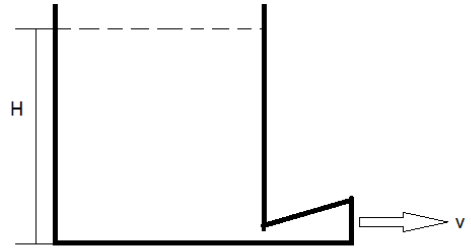Question

a.
steady and uniform
b.
unsteady and uniform
c.
steady and non-uniform
d.
unsteady and non-uniform
Posted under Fluid Mechanics
Interact with the Community - Share Your Thoughts
Uncertain About the Answer? Seek Clarification Here.
Understand the Explanation? Include it Here.
Q. A beaker contains water up to a certain height as shown. If the water is allowed to get discharged through a small diffuser, what type of flow will it be in the pipe?
Similar Questions
Explore Relevant Multiple Choice Questions (MCQs)
Q. A beaker contains water up to a certain height as shown. If the water is allowed to get discharged through a small nozzle, what type of flow will it be in the pipe?
View solution
Q. A beaker contains water up to a certain height as shown. If the water is allowed to get discharged through a small pipe (of a uniform diameter), what type of flow will it be in the pipe?
View solution
Q. The nature of streamlines in a flow net obtained by the combination of source and sink is
View solution
Q. What type of flow is obtained by superimposing two definite flow types? ( considering ideal condition)
View solution
Q. What is the term used for a case where source and sink( both of them are of equal magnitude) approach each other such, distance between them reduces and product of distance and discharge magnitude remains constant.
View solution
Q. Potential lines for the source-sink pair will be eccentric non intersecting circles with their centers on the axis.
View solution
Q. What is the characteristic of stagnation point?
View solution
Q. Streamlines of doublet flow are family of circles tangent to a common axis.
View solution
Q. In the equation for steam function due to source steam function is inversely proportional to magnitude at discharge.
View solution
Q. Which of the following is not a type of superimposed flow?
View solution
Q. How many stagnation points are present in a source and sink pair in a uniform flow?
View solution
Q. When a uniform flow is flowing through a doublet, resultant flow obtained is
View solution
Q. When is air assumed to be incompressible?
View solution
Q. For source flow, the radial velocity increases as we move radially outward.
View solution
Q. What is the nature of streamlines of free vortex flow?
View solution
Q. In free vortex flow, the flow is linear in nature.
View solution
Q. The pattern for streamlines and equipotential lines is different for source and sink flow.
View solution
Q. The sink flow is flow in which fluid moves radially inwards towards a point where it disappears at a variable rate.
View solution
Q. The source flow is flow coming from a point and moving out in a circular manner.
View solution
Q. What is a special characteristic of uniform flow parallel to X axis?
View solution
Recommended Subjects
Are you eager to expand your knowledge beyond Fluid Mechanics? We've handpicked a range of related categories that you might find intriguing.
Click on the categories below to discover a wealth of MCQs and enrich your understanding of various subjects. Happy exploring!








